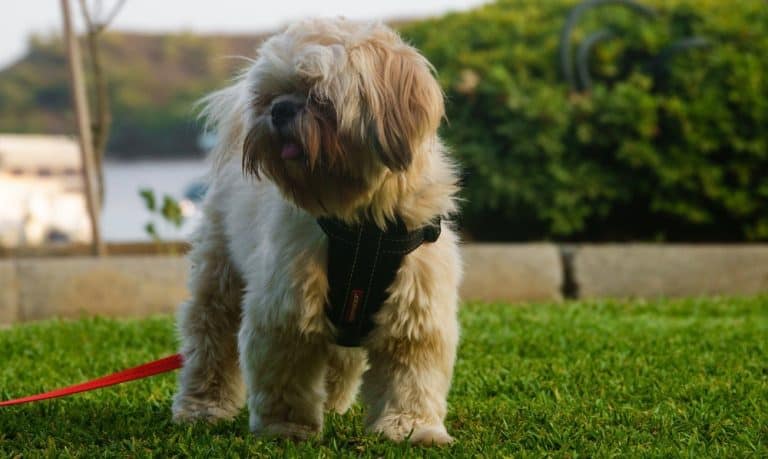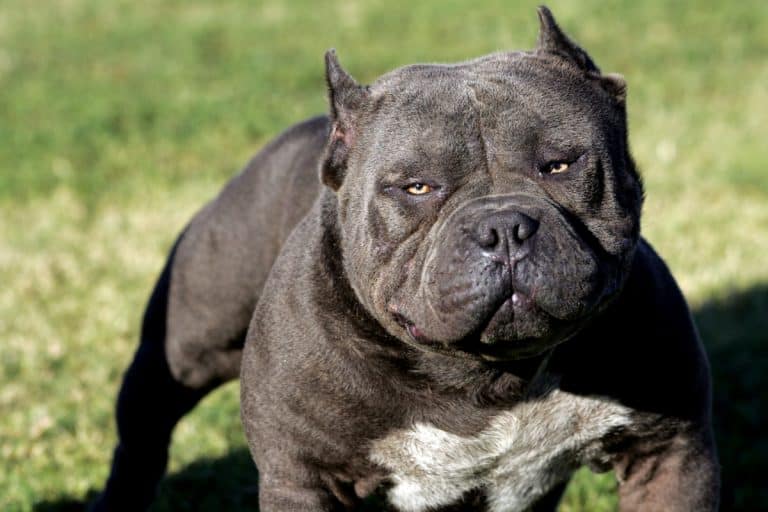Border Collie Growth Chart (Weight & Size Chart) – When Do Border Collies Stop Growing?
Owning a dog like a Border Collie can be very exciting and interesting. You get to watch it grow from a puppy to a big dog.
It is okay to ask questions about the Border Collie growth chart and wonder how big they can grow and if they are in the right size for their age.
Knowing what to expect regarding your dog’s growth within the next couple of months can help you get prepared and find out ways to take care of your pet.
We have come up with what you are to expect concerning the growth of your Border Collie. Keep reading to find out if your pet is growing and developing at the right rate.
When Do Border Collies Stop Growing?

Knowing when your Border Collie has reached its maximum size is excellent as it lets you know what to expect.
If you are not sure how big your dog can get, you might waste time wondering why your dog is not getting bigger or if it is too big already. It is, therefore, okay to wonder how long border collie grows.
Typically, Border Collies stop growing when they are between 12.5 to 15.5 months of age. Some of them will keep putting on weight after 15 months, but it usually stops entirely at 18 months.
Border Collies are known to be medium-sized dogs, and the average male gets up to 18 to 23 inches in height and weighs up to 45 pounds by the time they are adults.
While their female counterparts are slightly smaller, they can grow up to 17 to 20 inches in height and can weigh about 27 to 41 pounds as adults.
Border Collie Size Chart
The border collie weight chart below shows how much your pet will weigh at different milestones – from when they are puppies up to 12 months old. It shows the expected weight of a regular medium-sized Border Collie.
You can monitor the weight of your dog with this border collie growth chart. You can check your dog’s weight regularly and notice immediately any irregularities.
The growth rate of different puppies will be different; such differences are seen in the chart below.
Here is how to use the border collie puppy growth chart to determine your dog’s ideal weight. Simply find your dog’s age on the left side of the border collie size chart and match it to its current weight on the right side of the chart.
So, if your dog weighs 5.1 pounds at nine weeks, its expected weight at 12 months is 29.3 pounds.
Border Collie Weight Chart
| Age | lbs | lbs | lbs | lbs | lbs | lbs | lbs |
|---|---|---|---|---|---|---|---|
| 8 Weeks | 4.0 | 4.5 | 5.0 | 5.5 | 6.0 | 7.0 | 8.0 |
| 9 Weeks | 4.5 | 5.1 | 5.6 | 6.2 | 6.8 | 7.9 | 9.0 |
| 10 Weeks | 5.0 | 5.6 | 6.3 | 6.9 | 7.5 | 8.8 | 10.0 |
| 11 Weeks | 5.5 | 6.2 | 6.9 | 7.6 | 8.3 | 9.6 | 11.0 |
| 3 Months | 6.0 | 6.8 | 7.5 | 8.3 | 9.0 | 10.5 | 12.0 |
| 4 Months | 8.0 | 9.0 | 10.0 | 11.0 | 12.0 | 14.0 | 16.0 |
| 5 Months | 11.0 | 12.4 | 13.8 | 15.1 | 16.5 | 19.3 | 22.0 |
| 6 Months | 13.0 | 14.6 | 16.3 | 17.9 | 19.5 | 22.8 | 26.0 |
| 7 Months | 15.0 | 16.9 | 18.8 | 20.6 | 22.5 | 26.3 | 30.0 |
| 8 Months | 17.5 | 19.7 | 21.9 | 24.1 | 26.3 | 30.6 | 35.0 |
| 9 Months | 19.5 | 21.9 | 24.4 | 26.8 | 29.3 | 34.1 | 39.0 |
| 10 Months | 21.5 | 24.2 | 26.9 | 29.6 | 32.3 | 37.6 | 43.0 |
| 11 Months | 24.0 | 27.0 | 30.0 | 33.0 | 36.0 | 42.0 | 48.0 |
| Adult | 26.0 | 29.3 | 32.5 | 35.8 | 39.0 | 45.5 | 52.0 |
As mentioned earlier, each dog will grow differently due to many factors. You should be worried and visit the vet if your border collie is gaining or losing too much weight.
Border Collie Growth Chart: What to Expect
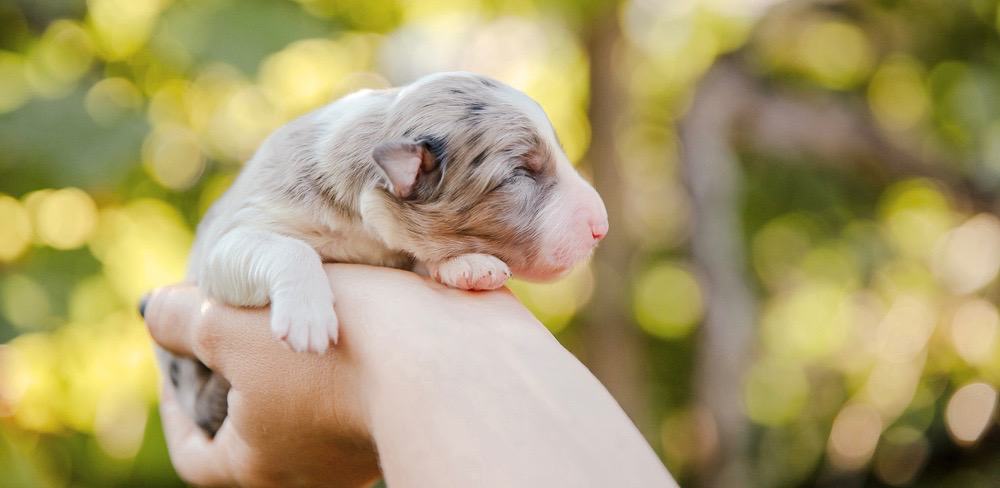
Birth to 2 Weeks
Border Collies are born very small. At birth, they weigh less than one pound, somewhere around seven to fourteen ounces. Within twenty-four hours of their delivery, they lose even more weight, called water weight.
But a healthy Border Collie begins to add weight rapidly after the first 24 hours, gaining form ½ to 1 ½ ounce every day. At two weeks, your puppy should weigh about 3 pounds.
Other milestones they should reach include opening their eyes and growing baby teeth.
3 Weeks to 12 Weeks
At this point, the puppies are still gaining weight rapidly and should continue like this until they are over 13 weeks old. By six weeks, they should be four times their birth weight – adding about 3 pounds every week.
Though each Border Collie puppy would grow differently, a healthy dog should be within this average weight in 12 weeks.
During this period, the puppy begins to be more socially aware. Since they are just getting used to the new environment and smell, they are very playful.
4 Months to 6 Months
At four months, the rapid weight increase in the Border Collie puppy reduces, and the dog begins to gain around one pound every week until it is six months old.
Now, the Border Collie is very active and has high energy levels, and are known to eat avidly to sustain this energy.
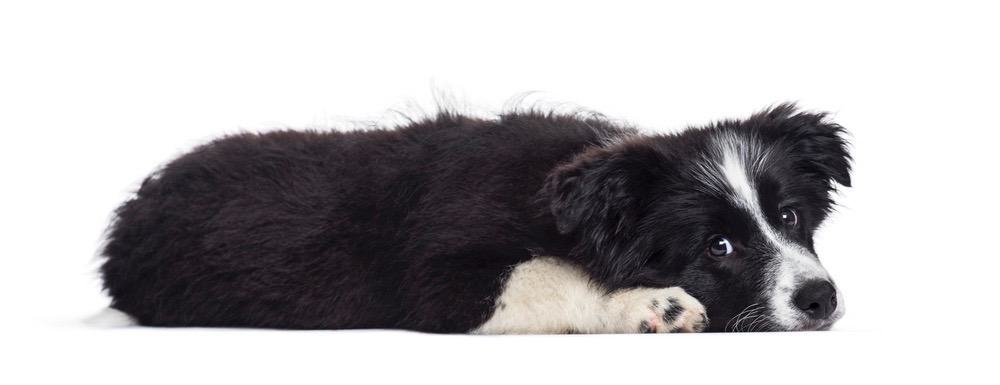
7 Months to 9 Months
At seven months, the Border Collie is now an adolescent and should weigh about 15 pounds. Your dog is just about to reach their sexual maturity.
They would have fully developed adult teeth, and their ears would have been fully formed with the tips drooping. If you have more than one Border Collie, you will notice a sudden closeness between them.
10 Months to 12 Months
At this point, the Border Collie is edging closer to adulthood. They would have reached their adult height of about 18 to 23 inches. They sometimes look lean and tall as their weight gain would have slowed down significantly.
At 12 months, they are still very active and hyper-metabolic, making them lose weight faster than they gain. You should feed them with high-calorie meals to match the energy they expend.
Adulthood
The adult Border Collie is indeed lovely. It should have added sufficient weight to fill all its bones. It usually has thick, shiny fur and can weigh 35 to 45 pounds.
Adult Border Collies don’t struggle to maintain a healthy weight. They just continue to add weight slowly until they reach their full size. They begin to behave like adult dogs and are no longer as active as they used to be.
Will Neutering/Spaying Affect My Border Collie’s Growth?
Neutering is the surgical removal of the male dog’s reproductive organs while spaying is the removal of the female dog’s reproductive organs, all done through surgery.
Spaying and neutering should be done when your Border Collie is between the ages of 5 and 9 months.
If done earlier than 5 months, your puppy’s growth may be affected because the growth plates have not yet fully developed. Since the reproductive and growth hormones are interconnected, your puppy may have joint issues or grow taller in the future.
Spaying and neutering reduce the risk of certain cancers such as breast and prostate, reduces aggressive behavior and marking of territory. It also prevents breeding and pregnancy.
How Big Will My Border Collie Puppy Get?
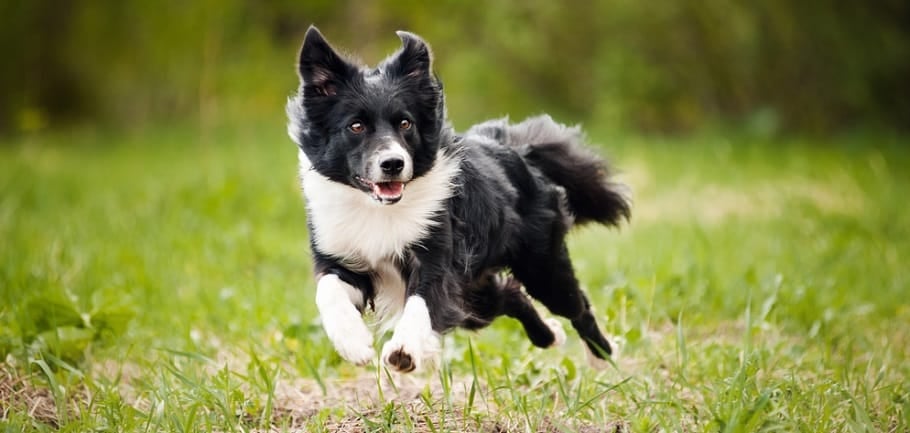
If you want to know how big your Border Collie will get when they are fully grown, look at their parents and paws. Parents give a clear indication of the adult size of your puppy.
If the parents are large, chances are your Collie will grow to be a large puppy. If your puppy’s paws are unusually small, your Collie will be small as an adult.
Adult male Border Collies weigh between 30 and 45 pounds and stand at a height of around 19 to 22 inches. Female Border Collies on the other hand weigh between 28 and 40 pounds and stand at a height of around 18 to 21 inches.
How To Properly Weigh And Measure A Border Collie?
Are you wondering how you can weigh your Border Collie at home? Weighing your puppy will allow you to keep track of their weight to ensure that they are maintaining an ideal weight for their age.
To weigh your Border Collie at home, you need a bathroom scale. First, step on the scale and weigh yourself. Then, carry your puppy and step on the scale.
Finally, subtract your weight from the total weight of you and your Border Collie. This is your puppy’s weight.
You can also buy a dog scale to weigh your Border Collie if they can sit still on the scale.
Border Collie Body Condition Score (BCS)
Body Condition Score is like BMI for humans. It is used to measure the fat level of animals including dogs. There are two scales used, one ranging from 1 to 5 and the other ranging from 1 to 9.
Visualization and palpation are used to assign BCS scores to animals. The ideal Body Condition Score for your Border Collie is 3/5 or 5/9. This is where the abdominal tuck is visible from the side and the waistline is visible from above.
With this score, the ribs are also palpable because of the thin layer of fat meaning that your puppy’s weight is right for their age category.
Border Collies Shape Changes
Border Collie puppies are born very small and become even smaller immediately after they are born. Then they experience a growth sprout for about three months where they become chubby cute puppies.
As they grow older, they experience drastic weight loss that makes them look skinny and gangly for a few months before they fill up nicely as an adult dog.
As an adult dog, the Border Collie has a muscular look. It has a beautiful waterproof double fur coat, making it suitable for it to be out in winter and summer. They are beautifully sleek and athletic dogs.
Factors That Affect Border Collie Growth

Every dog is unique and grows at its pace, so you cannot expect every Border Collie to be at the same size and weight at the same time. Some factors might influence their growth, and they include:
Genetics
Some Border Collies may suffer from some genetic health problems like epilepsy and hypodipsia. These conditions will usually start from when Border Collies are puppies but might not be evident on time.
Without dealing with these conditions, it will cause the puppy not to develop properly. That is why you should observe your puppy notice if they are in pain or if there is anything wrong with them.
Early detection and treatment of such conditions may help your dog get back on track and start growing correctly.
Nutrition
A dog fed properly and is under a good diet will grow healthier and better than one that is not.
When a Border Collie is fed with a balanced diet, they will grow appropriately for their age. The wrong diet will either make you have an underfed or an overweight dog, and both conditions are harmful to your dog.
It’s okay to visit a vet to get more information on the kind of nutrition appropriate for your dog.
Physical Activity And Health
Border Collies are very energetic dogs. They can be very active and like to move around a lot. Therefore, they need a lot of physical activity and cannot function properly if forced to lay all day indoors.
Exercise is good for the joints and bones of the puppy. It helps them stretch while keeping them healthy and preventing unhealthy weight gain.
How Long Are Border Collies Pregnant
Border Collies are usually pregnant for 63 days, which is about nine weeks. Sometimes the puppies can come anytime from 58 to 68 days.
It might be difficult for you to calculate the exact time of expectancy for your dog without a vet. This is because dogs usually do not show any signs of pregnancy in the first few weeks.
If you begin to notice signs like vomiting or unnecessary weight gain, it might be the right time to visit the vet and begin to prepare to welcome home your Border Collie puppies.
How Many Puppies Do Border Collies Have?
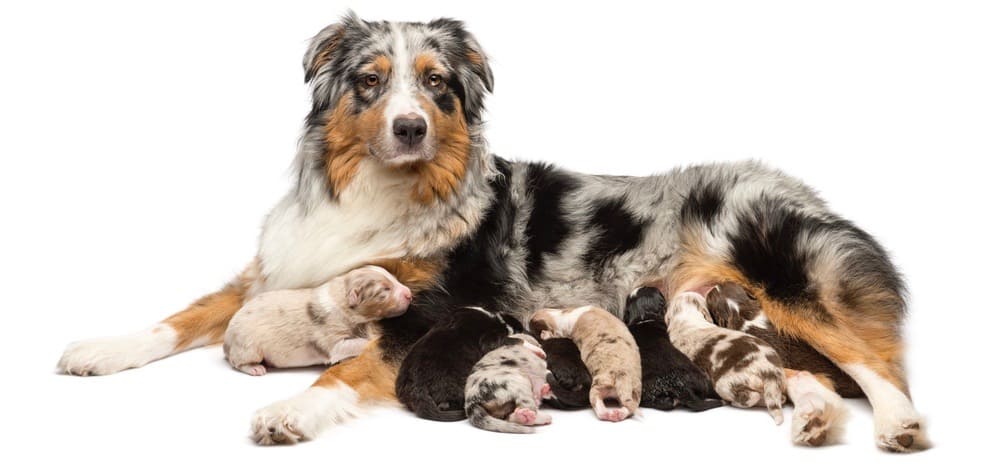
The litter size of a Border Collie may differ for many reasons. They can go from having a tiny litter to a large number of puppies.
The average number of puppies to expect is usually between 5 and 6, but sometimes you can get as little as four and as many as 8.
You cannot guess how many puppies to expect without the help of a vet. The vet can perform a scan to let you know how many puppies your Border Collie is expecting and if they are healthy.
What If My Border Collie Is Not The Right Weight?
If, according to the border collie weight chart, your Border Collie is too small or too big, there are some factors you can consider to put your dog right back on track.
Check if they are experiencing any pain or if they are ill. You can schedule a visit with your vet to make sure everything is alright with your dog.
Check that you are feeding your dog enough for its age. The diet of your Border Collie is essential for getting it to the right size.
Make sure it is getting enough exercise. Border Collies are originally herding dogs. They are genetically built to run around in the field. Therefore, you should give your dog ample time for exercise.
Make sure they are getting a sufficient amount of sleep. If they expend a lot of energy, they need enough sleep to replenish it.
What Is The Life Expectancy of My Border Collie?
Border Collies are dogs that have a long lifespan. They also make a great longtime companion because of their long life.
A healthy Border Collie is expected to live for at least ten years. They can go as long as 18 years, and a few get to live for more than 18 years.
How Much Does It Cost to Own a Border Collie?
The price of getting a Border Collie may vary because of different factors like the litter size, breeder reputation, and what they are to be used for. For regular dogs that are just meant to be pets, you can pay from 500 to 600 USD.
For premium Border Collies, you can pay up to 4,500 USD. Trained Border Collies can cost up to 7,500 USD because of the amount of time and effort spent training them.
To not get an illegal dog, make sure all necessary documentations are in place and properly signed.
Border Collie Genetics and Common Health Problems

Border Collies, like many other dogs, have genetic health problems that can affect them sometimes.
Because they are naturally herding dogs, they enjoy physical activities and can be healthy because of all the exercise they get. Some health situations that affect border collies include:
Dental Issues: for Border Collies, tarter can build up in their teeth and lead to infection of the teeth’ roots and the dog’s gums. If this situation is not handled on time and correctly, the Border Collie might end up losing their teeth.
Obesity: Many Border Collies have been known to have issues with obesity. They can quickly get overweight because of how easily they add weight at infancy. Obesity can lead to more severe issues like joint and digestive problems.
You should have a proper nutrition and diet plan for your dog instead of feeding it with leftover food.
Hip Dysplasia: This is a condition that can be inherited. It causes the hip joints to form inappropriately. For Border Collies, you might notice that it has a limp in its hind legs and has difficulty getting up. Noticing it on time can help treat it and save your dog from unnecessary pain.
Conclusion
Closely following your dog’s weight with a border collie puppy growth chart can help you give them the best care, know precisely when something is wrong and arrest it before it becomes a problem.
It is also great to have sufficient information about your dog handy to know what to expect and how to react to changes you might notice with your dog.
We have put this information together to help you give your Border Collie the proper care it deserves.






